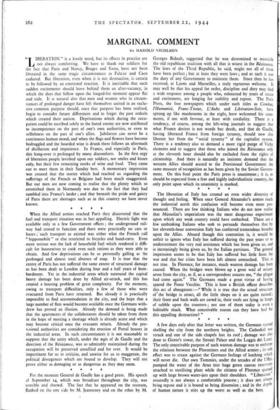For the moment General de Gaulle has a good press.
His speech of September 14, which was broadcast throughout the city, was sensible and shrewd. The fact that he appeared on the rostrum, flanked on the one side by M. jeanneney and on the other by M.
Georges Bidault, suggested that he was determined to reconcile the old republican tradition with all that is wisest in the Resistance. The laws of the Third Republic, he said, might not all of them have been perfect ; but at least they were laws ; and as such it was the duty of any Government to maintain them. Since then he has received, at Lyons and Marseilles, a truly rapturous welcome. It may well be that his appeal for order, discipline and duty may find a wide response among a people who, exhausted by years of strain and excitement, are longing for stability and repose. The Paris Press, the free newspapers which under such titles as Combat, l'Humanite, Franc-Tireur, L'Aube and Liberation-Soir, have sprung up like mushrooms in the night, have welcomed his state- ments, if not with fervour, at least with cordiality. There is a tendency, of course, among the left-wing journals to suggest that what France desires is not words but deeds, and that de Gaulle, having liberated France from foreign tyranny, should now also liberate her from the " social tyranny " of the capitalist system. There is a tendency also to demand a more rigid purge of Vichy elements and to suggest that those who joined the Resistance only at the eleventh hour should also be excluded from the rights of citizenship. And there is naturally an insistent demand that the western Allies should accord to the Provisional Government the same measure of recognition as has been given by the Soviet Govern- ment. On this final point the Paris press is unanimous ; it is, as should be expected from a free and highly individualistic country, the only point upon which its unanimity is marked.


























 Previous page
Previous page